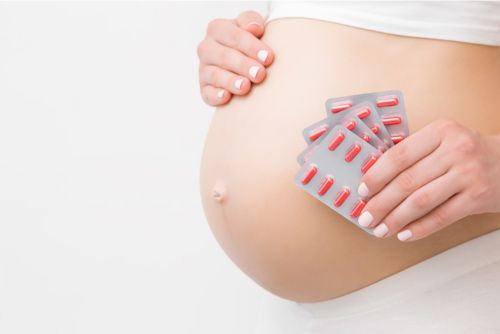Many women think about pregnancy as a time of wonder and awe. Nausea, pain and increasing responsibilities while ensuring that you are properly fostering the life inside you, can make you feel overwhelmed, hence nourishing your own body and soul is important
Book an appointment online to consult with Dr. Parul Jain for gynec issues.
Here are a few ideas on how to take care of yourself during pregnancy.
- Diet

During pregnancy, a woman should have an adequately nutritious diet. Adding about 200 calories a day, post-second trimester to the daily diet is usually considered sufficient to provide nourishment for both the mother to be and the foetus. Eating small, frequent meals throughout the pregnancy is important as you are expected to gain between 11-16 kilos, depending on your initial weight. Most of the extra calories should be protein as they are the building blocks.
Do you want to know the "Estimated date of when your baby is due?" Check out Cloudnine's Pregnancy Due Date Calculator now!
Below are some pointers that you should take care of- Your diet should be well-balanced, it should include fresh fruits, grains, and vegetables.
- Cereals that are high in fibre and low in sugar are a good choice
- Commercially prepared food often contain an excessive amount of salt so these should be consumed sparingly.
- Dieting to lose weight, even for obese women isn’t recommended. As some weight gain is essential for the normal development of the foetus.

- Most doctors recommend that pregnant women should take prenatal multivitamins containing iron and folate daily.
- Do not smoke, drink alcohol or do drugs as these may lead to growth retardation, mental deficiency and craniofacial or musculoskeletal abnormalities of the foetus.
- Ginger capsules (available as an over-the-counter option) may help with nausea in pregnancy, however consulting the doctor before ingesting any medicine is a must.
- Weight
How much weight could a woman gain during pregnancy depend on her body mass index (BMI) before pregnancy? BMI is weight in kilograms divided by height in meters squared and is used to determine whether the weight for a given height is normal. High BMI in a woman leads to less weight gain during pregnancy than those women who have their BMI classified as normal or underweight. Women should avoid gaining too much weight during their first trimester, that is not more than between 1 or 2 kilos each month. Not gaining weight at all can hinder the growth and development of the foetus and gaining too much would end in fat deposition.
- Drugs and Dietary Supplements

Do you want to know the"Estimated date of when your baby is due?" Check out Cloudnine's Pregnancy Due date Calculator now!
For any drug prescribed or non-prescribed or available across the counter, medical advice should be sought. You should specifically consult your doctor for what all dietary supplements should you take, as the number of various vitamins and minerals required by your body during time increases.
- Iron
- Pregnancy doubles the iron required usually in a human body. Most women take iron supplements because an average woman isn’t able to absorb enough through eating to fill the gap. However, these might cause mild constipation or similar minor disorders.
- Folate/ Folic Acid
– 400-600 micrograms of daily folate supplement are recommended for expecting women. These are usually available in the form of multi-vitamins. Usually, these are to be taken when you start planning to conceive as a deficiency in folate might lead to a baby birth defect of the brain or the spinal cord(neural tube defect), spina bifida.
- Calcium
– It aides in building the baby bones, teeth and strengthening mom’s bones too. The efficiency of the body to use that mineral increases during pregnancy.

- Vitamin D
- This is needed to absorb calcium in the body. Prenatal supplements usually contain more calcium than multivitamins, hence adequate sun exposure and Vitamin D supplements are needed to ensure the calcium absorption.
- Vitamin E
- 22-30 mg/day of Vitamin E is sufficient during human pregnancy. It is a fat-soluble vitamin found in vegetable oils, cereals, meat, poultry, eggs, fruits, vegetables etc. However, since the requirement is fulfilled by a balanced diet, taking it as a supplement should be avoided.
- DHA
- Most prenatal supplements also include the omega-3 fat docosahexaenoic acid (DHA). About 200 milligrams a day is necessary for foetal brain and vision development during pregnancy. Talk to your doctor about making sure you're getting enough omega-3 DHA in your diet.
- Care to be Taken During Physical Activity
Women can continue with their routine activities during pregnancy. Low Impact activities like swimming, brisk walking, weight training etc. after medical consultation can be pursued. However, high impact activities such as running, horseback riding are feasible under the supervision and after medical practitioner’s consultation to avoid injury, particularly to the abdomen. Contact sports should be avoided.
- Care to be Taken During Intercourse
The sexual desire usually varies during pregnancy. It is safe to have intercourse throughout pregnancy unless there are medical complications such as leakage of amniotic fluid, uterine contractions, pain or vaginal bleeding etc. Modifications are important with regard to sexual positions as the pregnancy progresses. If the expecting mother is having a history of abortions, intercourse should be avoided without prior medical consultation.
- Care To Be Taken While Traveling During Pregnancy
The most viable and safe time to travel during pregnancy is between 14th – 28th weeks.
- While travelling by road/ air or other ways of transport a seat belt should always be worn. The belts should be snug but not uncomfortable or tight.

Young pregnant woman travelling[/caption]- Pregnant women should be getting enough space to stretch and straighten the body, specifically stretch their legs periodically.- In or after 36th week travelling by air should be avoided because there are chances of going into labour during this time. And lowered oxygen levels may cause fetal hypoxia in high-altitude regions.
- Personal Hygiene During Pregnancy
Skincare, haircare, breast care, dental care, bowel elimination, vaginal douching, and clothing are all important for the mother to be.
Must read - What are the Infections you should watch out for?
- Skin Care
The skin glands could get more active during pregnancy and tend to perspire more. Frequent baths or showers with shower gels/ soaps are recommended until 32nd week. Later to that, medical advice is recommended.- Therapeutic baths relax tensed and tired muscles, counter insomnia, and makes the expecting women feel fresh and sweet-smelling.- Bathing in tubs or while sitting on stools may pose a physical manoeuvrability problem; so showers are recommended during late stages.
- Stretch Marks
Pregnancy often makes your body grow faster than your skin can keep up with, leading to the breakage of elastic fibres just under the surface of the skin causing stretch marks.- Lotion/ Cream - The idea is to keep your skin hydrated with a rich lotion or cream.

- Do not use Retin - or other chemicals as they might be harmful when you are pregnant or nursing.- Egg Oil could be used regularly from the first trimester, to subside pregnancy-related stretch marks.
- Hair Care
The oil glands also increase their secretions and the hair tends to get oily more often thereby requiring frequent shampoo.
Know more - Skin and Hair changes during Pregnancy.
- Breast Care
It is important to begin preparing the breast for breastfeeding during the prenatal period. Post the fourth month, a fluid called colostrum might be secreted leaving the breasts itchy and damp. Washing is the basic form of hygiene and is to be done without soap to remove dried colostrum, and lanolin must be applied after to prevent evaporation of perspiration and softening the skin.
- A well-fitted support bra should be worn at all times to support the enlarging breasts.
- Pads may be worn inside the bra cups to absorb colostrum leakage from the nipples and should be replaced/changed as and when required.
- Dental Care

The would-be mother must maintain normal dental hygiene, that is brushing at least two times a day. Women can suffer from tooth problems because of increased estrogen levels lead to swelling and sensitivity of the gums. Additionally
- Minor dental work/ procedures, such as fillings, capping and simple extractions, may be done during pregnancy; however, avoid anaesthetics.
- Major Procedures like dental surgery should be postponed until after the pregnancy as they need to use anaesthetics. Anaesthetics and analgesics may affect the developing foetus.
- Bowel Elimination
Women who had no problems with bowel usually experience a little or no change in the daily routine. But those who are prone to constipation, get a stool to become noticeably more irregular during pregnancy because of:
- Decreased physical exertion and bowel relaxation, as a response to changing hormones.
- Pressurized bowel from the gravid uterus.
- The constipating effect due to iron supplements.

Must-read - Tips for Healthy and Happy Pregnancy
High fibre diet and fluid intake, followed up by regular exercise would improve the condition.
- Vaginal Douching
Normal vaginal secretions are usually intensified during pregnancy due to active hormonal changes. Vaginal douching should never be done without consulting a medical practitioner, as it might lead to air embolism or infection.
- Feminine hygiene deodorant sprays should not be used as they might lead to perineal irritation, cystitis, and urethritis. Undesirable odours can be controlled with daily use of soap and water as prescribed by the consultant
- If douche is prescribed, it should be done slowly using a gravity bag. Douches shouldn’t be done while sitting on a toilet so to avoid injury by falling and the tip is not to be inserted deeper than 3 inches.
You can also join our Cloudnine Community to discuss and get more information about - First Time Pregnancy, Pregnancy Daily Care, Stretch Marks & Pregnancy Nutrition.
- Clothing

Clothes are of utmost importance during pregnancy as they give a sense of well being to the expecting mother. The clothes should be lightweight, preferably cotton, non-constrictive, adjustable, absorbent, and enhance the sense of well-being of the would-be mother.
- Shoes/Foot Care
Nothing you wear during pregnancy is as important as shoes, and these shoes should be comfortable and well-fitting, easy to wear, especially in the last trimester when it is difficult to bend.
- Flats or shoes with a low heel, not more than 1 or 1 ½ inch should be worn. These help you to maintain your balance and stability in late pregnancy.
- They should also have a good solid base of support (broad heel) to avoid tottering.
- Massaging and foot rubbing leads to better circulation and toning of the feet muscles.
Good news, now you can shop right away from wide range of Mom's Bath & Skin products on Cloudnine Momeaze.
- Care Tips During Work

Work schedules should be suitably modified during pregnancy, to promote foetus growth, relaxation and continue good muscle tone thereby preventing muscle atrophy.
- Footstools can help prevent pressure on veins, relieve strain on varices, and minimize swelling of the feet.
- You should resort to frequent rest periods
Watch video on Tips for Pregnancy:
- Take a break and walk around every two hours.
- Drink plenty of fluids to prevent dehydration.
These steps will help prevent fatigue, relieve tension, and increase circulation.
Want to consult the best gynecologists in India? Please find the links below.
- Best Gynecologists in Bangalore
- Best Gynecologists in Chennai
- Best Gynecologists in Mumbai
- Best Gynecologists in Pune
- Best Gynecologists in Chandigarh
- Best Gynecologists in Gurgaon
- Best Gynecologists in Noida
Want to consult the best Maternity Packages in India? Please find the links below.


